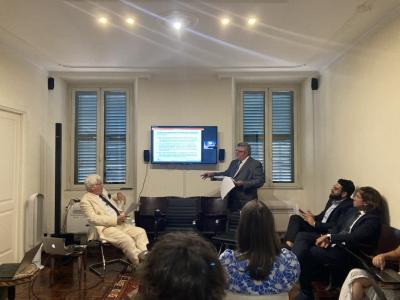EGIC conference: 'We need to get excited about the Abraham Accords'

ROME – The historic importance of the Abraham Accords, a rapprochement signed in 2020 between Israel, the UAE and Bahrain, was highlighted at the ‘Trading for peace; An economic look at the Abraham Accords’ event held by the Euro-Gulf Information Centre (EGIC) from its headquarters in the Italian capital.
The event, which was introduced by director or the EGIC Matthew Robinson, was also live streamed for people outside of Rome to listen to the event on Thursday evening.
Robinson briefly introduce the panel of guests which was moderated by Keith Boyfield, an economist and senior fellow at the EGIC. The guests included Henry Tillman, founder and chair of China Investment Research, Dan Feferman, director of communications & global affairs at Sharaka as well as Co-Chair of the Gulf-Israeli Policy Forum.
Linking up via Zoom was Najat Al-Saeed, adjunct professor at the American University in Dubai and Media Affairs & Academic Advisor at Sharaka.
The Abraham Accords were first contextualised by Boyfield who explained how they were created in the dying days of the Donald Trump administration and helped to establish diplomatic and commercial ties between Israel, the UAE and Bahrain - the first public normalization of relations between Arabs countries and Israel since 1994.
Among examples that Boyfield cited of the success of the agreement was the 12 economic agreements that have been signed between the countries across a range of sectors including aviation, banking, technology and transport infrastructure.
First to take to the floor to present was Henry who provided further examples of the economic success of these accords. He highlighted how with regards to renewable energy “the West is not moving as quickly compared to this region.”
Feferman then spoke and drew on his own personal experience to provide a fascinating insight into the cultural significance and success of the agreements. He said that it was “unbelievable that he can as an Israeli citizen get on plane and fly to Dubai as easily as Rome. It’s amazing the normalisation of relations.”
“The sheer excitement of going to a place in the Arab world that we were welcomed to go to was almost euphoric in Israeli terms.”
He added how when he first landed in Dubai that someone said to him that “you are an alien to me” in terms of the cultural knowledge between the two countries but now through these agreements things are changing and quickly.
Feferman cited how there are now “kosher catering facilities at hotels. There are four make shift synagogues in Dubai” and how “over 150,000” people” flew from Israel to the UAE in the first year despite there being 3 lockdown due to the pandemic.
Al-Saeed then joined in via video link to add her insight to the discussion. She stressed how the agreements needed to trigger action and business deals “not just business deals between governments but small business and entrepreneurs.”
The floor was then opened to questions and the panellists responded to questions ranging from potential expansion to include other countries in the agreement to the problems of extremism and implementation across different cultures.
The evening was then rounded off with some closing remarks from Matthew Robinson who concluded the event by saying “from a European standpoint we need to get excited about the Abraham Accords. There’s so much more we can do to promote the accords. They are so beneficial.”
© COPYRIGHT ITALIAN INSIDER
UNAUTHORISED REPRODUCTION FORBIDDEN


